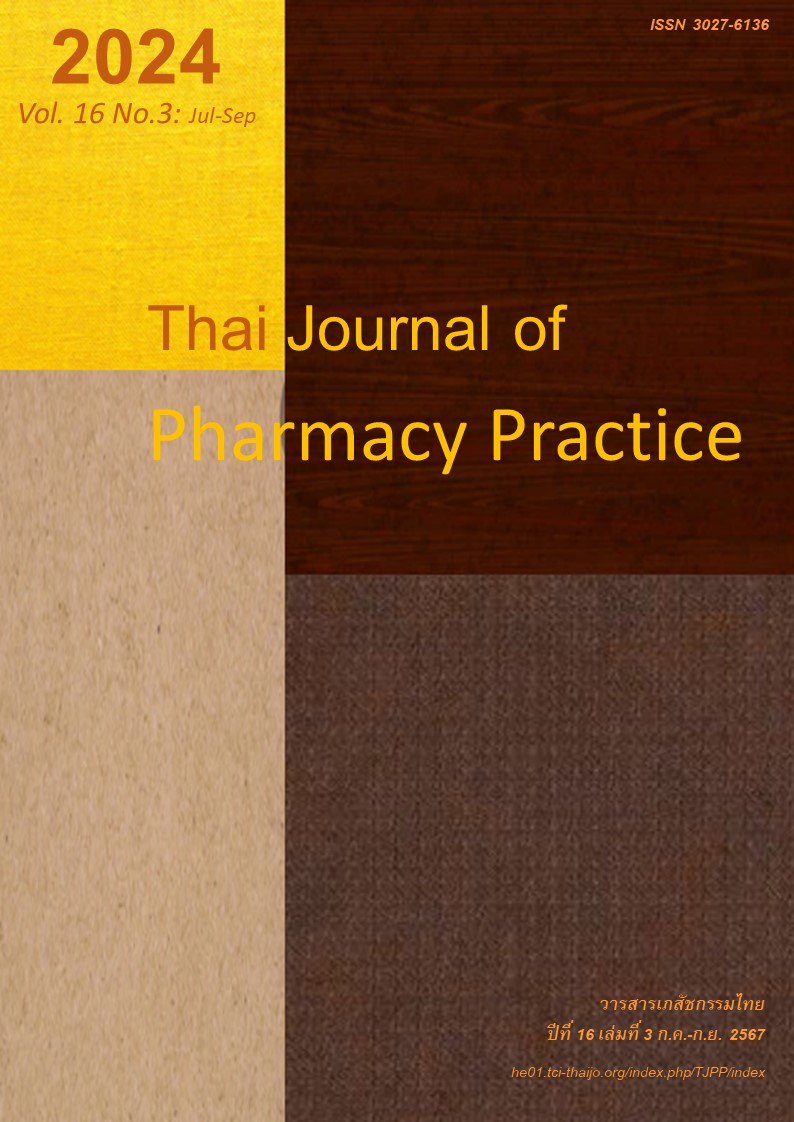การทำนายภาวะเลือดเป็นกรดจากแลคติกที่สัมพันธ์กับการใช้ยาเมทฟอร์มิน ด้วยเทคนิคการเรียนรู้ของเครื่อง: กรณีศึกษาโรงพยาบาลสุรินทร์
Main Article Content
บทคัดย่อ
วัตถุประสงค์: พัฒนาแบบจำลองการทำนายภาวะเลือดเป็นกรดจากแลคติกที่สัมพันธ์กับการใช้ยาเมทฟอร์มิน (metformin-associated lactic acidosis: MALA) และเปรียบเทียบผลการทำนายภาวะ MALA จากแบบจำลองด้วยเทคนิคการเรียนรู้ของเครื่องแต่ละประเภท วิธีการ: การศึกษาเก็บข้อมูลแบบย้อนหลังจากเวชระเบียนอิเล็กทรอนิกส์ของผู้ป่วยเบาหวานอายุ 18 ปีขึ้นไปที่ได้รับยาเมทฟอร์มินของโรงพยาบาลสุรินทร์ ระหว่าง มกราคม 2560 ถึง ธันวาคม 2564 ปัจจัยที่นำมาสร้างแบบจำลองคือ ค่าดัชนีมวลกาย ขนาดยาเมทฟอร์มินที่ได้รับต่อวัน โรคอ้วน การได้ NSAIDs ใน 6 เดือน การได้รับยากลุ่ม thiazides การได้รับยากลุ่ม beta blockers การได้รับยากลุ่ม statins ระดับการทำงานของไต ภาวะไขมันในเลือดผิดปกติ และระยะเวลาที่ได้รับการวินิจฉัยโรคเบาหวาน การศึกษาใช้เทคนิคการเรียนรู้ของเครื่องชนิดมีผู้สอนแบบแบ่งแยกประเภท เทคนิคการเรียนรู้ของเครื่องที่ใช้ได้แก่ Logistic Regression (LR), Multi-layer Perceptron (MLP), Support Vector Machine (SVM) และ Random Forest (RF) ผลการวิจัย: ผู้ป่วยเบาหวานที่ได้รับยาเมทฟอร์มิน 8,505 ราย แบ่งเป็นผู้ป่วยเบาหวานปกติ 8,387 ราย และผู้ป่วยเบาหวานที่เกิดภาวะ MALA 118 ราย แบบจำลองจากเทคนิค RF และ MLP มีความถูกต้องมากกว่า LR อย่างมีนัยสำคัญ เมื่อทดสอบพบแบบจำลองจาก RF ให้ค่า sensitivity 93.30%, specificity 93.57%, accuracy 95.26%, และ AUROC 0.992 สรุป: แบบจำลองการทำนายภาวะ MALA ด้วยเทคนิคการเรียนรู้ของเครื่องโดยเทคนิค RF ให้แบบจำลองที่มีประสิทธิภาพสูงสุด
Article Details

อนุญาตภายใต้เงื่อนไข Creative Commons Attribution-NonCommercial-NoDerivatives 4.0 International License.
ผลการวิจัยและความคิดเห็นที่ปรากฏในบทความถือเป็นความคิดเห็นและอยู่ในความรับผิดชอบของผู้นิพนธ์ มิใช่ความเห็นหรือความรับผิดชอบของกองบรรณาธิการ หรือคณะเภสัชศาสตร์ มหาวิทยาลัยสงขลานครินทร์ ทั้งนี้ไม่รวมความผิดพลาดอันเกิดจากการพิมพ์ บทความที่ได้รับการเผยแพร่โดยวารสารเภสัชกรรมไทยถือเป็นสิทธิ์ของวารสารฯ
เอกสารอ้างอิง
Diabetes Association of Thailand. Clinical practice guideline for diabetes 2018 [online]. 2018 [cited Apr 14, 2023]. Available from: dmthai.org/new/index.php /sara-khwam-ru/bukhlakr-thangkar-phaethy/cpg/guid eline-diabetes-care-2018
American Diabetes Association. 9. Pharmacologic approaches to glycemic treatment: standards of medical care in diabetes—2021. Diabetes Care. 2021; 44(Suppl 1): S111-S124. doi: 10.2337/dc21-S009.
Andersen LW, Mackenhauer J, Roberts JC, Berg KM, Cocchi MN, Donnino MW. Etiology and therapeutic approach to elevated lactate levels. Mayo Clin Proc 2013; 88: 1127–40.
Inzucchi SE, Lipska KJ, Mayo H, Bailey CJ, McGuire DK. Metformin in patients with type 2 diabetes and kidney disease: a systematic review. JAMA 2014; 312: 2668- 75.
The Nephrology Society of Thailand. Clinical practice recommendation for the evaluation and manage ment of chronic kidney disease in adults 2022 (revised edition) [online]. 2022 [cited Apr 11, 2023]. Available from: www.nephrothai.org/wp-content/uplo ads/2023/03/CKD-guideline-2565-revised-edition.pdf
Kesornsit W, Lorchirachoonkul V, Jitthavech J. Imbalanced data problem solving in classification of diabe tes patients. KKU Research Journal. 2018; 18: 11–21.
Pruneski JA, Williams RJ, Nwachukwu BU, Ramku mar PN, Kiapour AM, Martin RK, et al. The develop ment and deployment of Machine Learning Models. Knee Surg Sports Traumatol Artheosc 2022; 30: 3917–23.
Shouval R, Bondi O, Mishan H, Shimoni A, Unger R, Nagler A. Application of machine learning algorithms for clinical predictive modeling: A data-mining approach in SCT. Bone Marrow Transplant. 2013; 49: 332–7.
Eppenga WL, Lalmohamed A, Geerts AF, Derijks HJ, Wensing M, Egberts A, et al. Risk of lactic acidosis or elevated lactate concentrations in metformin users with renal impairment: a population-based cohort study. Diabetes Care. 2014; 37: 2218-24.
Trinkley KE, Anderson HD, Nair KV, Malone DC, Saseen JJ. Assessing the incidence of acidosis in patients receiving metformin with and without risk factors for lactic acidosis. Ther Adv Chronic Dis. 2018; 9: 179–90.
Kuan IH, Savage RL, Duffull SB, Walker RJ, Wright DF. The association between metformin therapy and lactic acidosis. Drug Safety. 2019; 42: 1449-69.
Soto C, Seresangtakul P, Tangvoraphonkchai V. Model for cervical cancer result prediction using artificial neural network. KKU Research Journal. 2013; 13: 39–50.
Thammasudjarit R, Ingsathit P, Saputro SA, Ingsa thit A, Thakkinstian A. Comparison of machine learning with logistic regression for prediction of chronic kidney disease in the Thai adult population. Ramathibodi Medical Journal. 2021; 44: 1–12. doi.org/10.33165/rmj.2021.44.4.250334
Su C-T, Chang Y-P, Ku Y-T, Lin C-M. Machine learning models for the prediction of renal failure in chronic kidney disease: A retrospective cohort study. Diagnostics. 2022; 12: 2454. doi: 10.3390/diagnosti cs12102454.
Mehrpour O, Saeedi F, Hoyte C, Goss F, Shirazi FM. Utility of support vector machine and decision tree to identify the prognosis of metformin poisoning in the United States: Analysis of national poisoning data system. BMC Pharmacol Toxicol. 2022; 23: 49. doi: 10.1186/s40360-022-00588-0.


